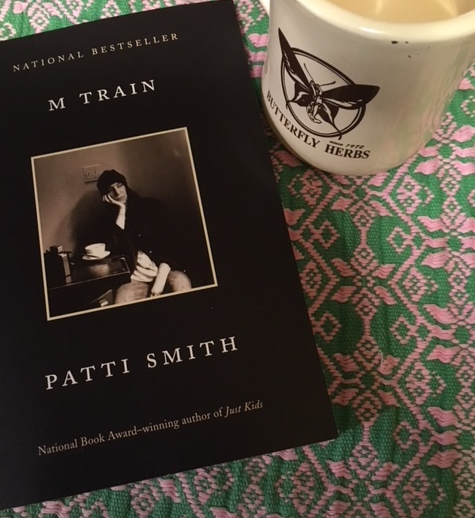
My heroines buck tradition and speak up, even when it is hard for them. I adore them for their guts and their willingness to wade into the din and add to the cacophony. Of those who are musicians, I’m most drawn to the loud, the ugly, the insistent, because they often say what I cannot or will not, too cowed by a lifetime of holding myself back, of buckling beneath the thumb of various oppressors, real or imagined. A few recent entries into the genre of “rock memoir,” all coincidentally penned by women, reveal a trove of thoughts and ideas about the challenges of art-making, whether viewed through a lens of gender or, more often, a lens that rejects any such affiliation.
Patti Smith: M Train. In M Train, author Patti Smith goes inward for a more intimate perspective of the poet’s life, a markedly different treatment than the lauded Just Kids, which solidified her stature as a legitimate author of some significance. In M Train, the rocker-poet details a series of favorite coffee shops and writing haunts around the globe and describes the solitary pursuits of an artist afforded the luxury of time, of wandering thoughts and missives to beloved objects—chairs, tables, a watchman’s cap—interwoven with memories and anecdotes of friends, loved ones, and beloved artists gone too soon.
Kim Gordon: Girl in a Band: The longtime bassist of indie rock band Sonic Youth sets aside her natural reticence to unleash a simultaneously deep and dishy account of her fascinating life in intersecting worlds of rock music and contemporary art. Though she normally left interviews and press to bandmate and husband Thurston Moore, Gordon’s influence and contributions to the band were pivotal, and her exposure to art and ideas predated Sonic Youth by many years. Gordon’s memoir does not disappoint fans seeking backstage access to the details of her and Moore’s relationship. The demise of their long marriage threw her life into disarray and led to the dissolution of the band, and she holds nothing back in her side of the retelling. It also led to new projects, creative partnerships, and space for her to step forward and steer her life and artistic output in more fulfilling directions, all while keeping vast stores of indie credibility intact.
Kristin Hersh: Don’t Suck, Don’t Die, Don’t Give Up. The Throwing Muses lead established herself as a formidable and original writer in her book debut, Rat Girl, expanding on her diary entries from her 18th year. She reappears in this volume older, married, and more focused, though no less mercurially talented and unconcerned with convention. Her memories of the late musician Vic Chestnutt, who died on Christmas Day, 2009 from an overdose of muscle relaxants after decades of medical concerns, are by turns hilarious and heartbreaking. In the end, though centered around her friendship and musical collaborations with Chestnutt, this memoir is a poetic accounting of grief and hard lessons, a chronicle of loss, with marriages, friendships, and dearly beloved souls the casualties.
Carrie Brownstein: Hunger Makes Me a Modern Girl. Lead guitarist of rock group Sleater-Kinney gives the lowdown on her life in the vanguard of post-punk feminist rock, addressing the music and ethos of a group that wears the descriptor “strident” as a badge of honor. The revelation of the concentrated effort the group made to create their confrontational, in-your-face sound and presence was a gift to this reader, who otherwise might have continued to believe the members came by their onstage bravado naturally. Indeed, the members traveled all the way to Australia to debut the band, performing their first live sets before welcoming audiences abroad before braving the brutally critical fans and peers in America. The ever-present audience, quick to judge and criticize, has figured prominently in Brownstein’s awareness since her earliest onstage experiences. Her studied tone in this outing, among the very best of the recent rock tell-alls, is entirely appropriate in light of it all.